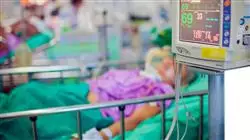University certificate
The world's largest faculty of medicine”
Introduction to the Program
You will access a library of advanced content in the area of Psychiatric Emergencies, addressing developments in suicidal behavior, anxiety disorders and special pharmacopoeia”

From the most pressing anxiety disorders, mainly caused by COVID-19, to emergencies in affective or psychotic disorders, the pressure on Psychiatry specialists is greater than ever. This new paradigm, where mental illness and mental health become a major concern, opens a special framework of action for all specialists in this area.
This means that, now more than ever, there is an urgent need for updating in the most relevant psychiatric areas. Advances in the treatment of generalized anxiety disorder or emergencies, caused by the ingestion of different types of drug, encourage specialists to access first level scientific postulates, with a categorical approach that can be incorporated into their daily practice.
This Professional master’s degree is an extensive tour of the most relevant Psychiatric Emergencies, focusing on the developments made in recent years. Through an eminently practical perspective, the teaching team has compiled both the theory and the most rigorous clinical practice in a high quality format, with great multimedia support.
Specialists will be able to access video summaries, complementary readings, real clinical cases and self-knowledge exercises for each topic covered. All this with the advantage of having a virtual classroom available 24 hours a day, so students can study at their own pace.
You will have the freedom to decide where, when and how to take on the full course load, with no on-site classes or pre-set schedules to restrict you"
This Professional master’s degree in Psychiatric Emergencies contains the most complete and up-to-date scientific program on the market. The most important features include:
- The development of practical cases presented by experts in Psychiatric Emergencies
- The graphic, schematic, and practical contents with which they are created, provide scientific and practical information on the disciplines that are essential for professional practice
- Practical exercises where self-assessment can be used to improve learning
- Its special emphasis on innovative methodologies
- Theoretical lessons, questions to the expert, debate forums on controversial topics, and individual reflection assignments
- Content that is accessible from any fixed or portable device with an Internet connection
Get up to date with the most important advances in psychopathological examination in emergencies, neurological diseases, differential diagnosis of anxiety and emergencies derived from new technologies"
The program’s teaching staff includes professionals from the sector who contribute their work experience to this educational program, as well as renowned specialists from leading societies and prestigious universities.
Its multimedia content, developed with the latest educational technology, will allow professionals to learn in a contextual and situated learning environment, i.e., a simulated environment that will provide immersive education programmed to prepare in real situations.
The design of this program focuses on Problem-Based Learning, by means of which professionals must try to solve the different professional practice situations that arise during the academic year. This will be done with the help of an innovative system of interactive videos made by renowned experts.
You will be able to download all the available content of the virtual classroom from the comfort of your tablet, smartphone or computer of choice"

Learn more about recent developments in the use of psychotropic drugs in Psychiatric Emergencies, psychomotor agitation and acute confusional state"
Why study at TECH?
TECH is the world’s largest online university. With an impressive catalog of more than 14,000 university programs available in 11 languages, it is positioned as a leader in employability, with a 99% job placement rate. In addition, it relies on an enormous faculty of more than 6,000 professors of the highest international renown.

Study at the world's largest online university and guarantee your professional success. The future starts at TECH”
The world’s best online university according to FORBES
The prestigious Forbes magazine, specialized in business and finance, has highlighted TECH as “the world's best online university” This is what they have recently stated in an article in their digital edition in which they echo the success story of this institution, “thanks to the academic offer it provides, the selection of its teaching staff, and an innovative learning method aimed at educating the professionals of the future”
A revolutionary study method, a cutting-edge faculty and a practical focus: the key to TECH's success.
The most complete study plans on the university scene
TECH offers the most complete study plans on the university scene, with syllabuses that cover fundamental concepts and, at the same time, the main scientific advances in their specific scientific areas. In addition, these programs are continuously being updated to guarantee students the academic vanguard and the most in-demand professional skills. In this way, the university's qualifications provide its graduates with a significant advantage to propel their careers to success.
TECH offers the most comprehensive and intensive study plans on the current university scene.
A world-class teaching staff
TECH's teaching staff is made up of more than 6,000 professors with the highest international recognition. Professors, researchers and top executives of multinational companies, including Isaiah Covington, performance coach of the Boston Celtics; Magda Romanska, principal investigator at Harvard MetaLAB; Ignacio Wistumba, chairman of the department of translational molecular pathology at MD Anderson Cancer Center; and D.W. Pine, creative director of TIME magazine, among others.
Internationally renowned experts, specialized in different branches of Health, Technology, Communication and Business, form part of the TECH faculty.
A unique learning method
TECH is the first university to use Relearning in all its programs. It is the best online learning methodology, accredited with international teaching quality certifications, provided by prestigious educational agencies. In addition, this disruptive educational model is complemented with the “Case Method”, thereby setting up a unique online teaching strategy. Innovative teaching resources are also implemented, including detailed videos, infographics and interactive summaries.
TECH combines Relearning and the Case Method in all its university programs to guarantee excellent theoretical and practical learning, studying whenever and wherever you want.
The world's largest online university
TECH is the world’s largest online university. We are the largest educational institution, with the best and widest online educational catalog, one hundred percent online and covering the vast majority of areas of knowledge. We offer a large selection of our own degrees and accredited online undergraduate and postgraduate degrees. In total, more than 14,000 university degrees, in eleven different languages, make us the largest educational largest in the world.
TECH has the world's most extensive catalog of academic and official programs, available in more than 11 languages.
Google Premier Partner
The American technology giant has awarded TECH the Google Google Premier Partner badge. This award, which is only available to 3% of the world's companies, highlights the efficient, flexible and tailored experience that this university provides to students. The recognition as a Google Premier Partner not only accredits the maximum rigor, performance and investment in TECH's digital infrastructures, but also places this university as one of the world's leading technology companies.
Google has positioned TECH in the top 3% of the world's most important technology companies by awarding it its Google Premier Partner badge.
The official online university of the NBA
TECH is the official online university of the NBA. Thanks to our agreement with the biggest league in basketball, we offer our students exclusive university programs, as well as a wide variety of educational resources focused on the business of the league and other areas of the sports industry. Each program is made up of a uniquely designed syllabus and features exceptional guest hosts: professionals with a distinguished sports background who will offer their expertise on the most relevant topics.
TECH has been selected by the NBA, the world's top basketball league, as its official online university.
The top-rated university by its students
Students have positioned TECH as the world's top-rated university on the main review websites, with a highest rating of 4.9 out of 5, obtained from more than 1,000 reviews. These results consolidate TECH as the benchmark university institution at an international level, reflecting the excellence and positive impact of its educational model.” reflecting the excellence and positive impact of its educational model.”
TECH is the world’s top-rated university by its students.
Leaders in employability
TECH has managed to become the leading university in employability. 99% of its students obtain jobs in the academic field they have studied, within one year of completing any of the university's programs. A similar number achieve immediate career enhancement. All this thanks to a study methodology that bases its effectiveness on the acquisition of practical skills, which are absolutely necessary for professional development.
99% of TECH graduates find a job within a year of completing their studies.
Professional Master's Degree in Psychiatric Emergencies
Psychiatric emergencies can be a major challenge for healthcare professionals, requiring careful assessment and prompt, effective intervention. At TECH Global University, we are committed to continuing education and improving clinical practice, which is why we have developed the Professional Master's Degree in Psychiatric Emergencies, available online to facilitate your learning from anywhere, anytime. Our graduate program is designed to provide healthcare professionals with the skills and knowledge necessary to manage psychiatric emergency situations efficiently and effectively. Throughout the program, you will learn about the most common psychiatric disorders that may present in an emergency, how to perform an appropriate initial assessment, how to manage agitation and violence, and how to deal with suicidal and anxiety crises.
Study psychiatric emergencies at the best Faculty of Medicine
.
The best thing about this Professional Master's Degree is that you can do it online, from the comfort of your home or any location you choose, in a flexible and personalized learning environment. Our program uses a combination of online resources, virtual tutorials and hands-on activities to help you develop the skills and knowledge you need to improve your clinical practice and provide optimal care to your patients. In addition, at TECH Global University, we ensure that our postgraduate program is at the forefront of the most recent advances and trends in the field of mental health. Therefore, not only will you benefit from a high-quality program, but you will also be up to date on the latest research and developments in the field of psychiatric emergencies. In short, if you are a medical professional interested in improving your skills and knowledge in the management of psychiatric emergencies, our Professional Master's Degree is the perfect choice for you. Enroll now and start improving your clinical practice today.







